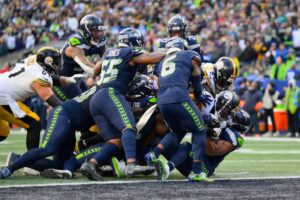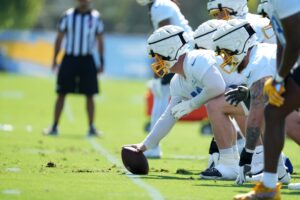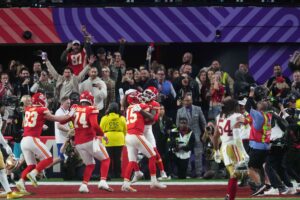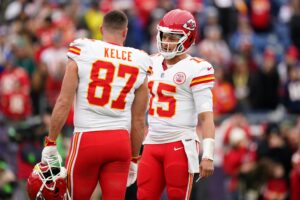The Philosophical Difference Separating the Top and Bottom of the NFC: Time of Possession
The Unexpected Change for the Cowboys
The 2016 Dallas Cowboys represent one of the fascinating team success stories in the last decade of the NFL. The Cowboys have always been around during the past few seasons. They’ve been in the conversation, but not really in legitimate Super Bowl contention. Tony Romo, fairly or not, was receiving a ton of criticism. While being a great regular season quarterback, he always had found ways to blow it when the stakes mattered. That was his reputation.
Now things are different. Unexpectedly so. The Cowboys entered 2016 with hype. Tony Romo was finally healthy, after breaking the same collarbone twice in 2015. They drafted Ezekiel Elliott fourth overall, making him only the third running back drafted that high in the past decade. They’d be lining up Romo and “Zeke” behind arguably the best offensive line assembled this century, and Dez Bryant was finally healthy. Things were looking up for the Cowboys.
Then, in week three of the preseason, Romo suffered compression fractures in his back, causing him to have surgery. This was his third major back injury since the start of 2013. All of a sudden, the much hyped Cowboys were done. It was unsure how long Romo would be out. Ian Rapoport had reported that, if all went well, the Cowboys would target a week eight return for Romo. All of a sudden, the rookie fourth-round pick – the eighth quarterback taken in the 2016 draft – was forced into action. Enter Dak Prescott.
Chip Kelly’s Arrival in San Francisco
There was a hint of optimism in San Francisco over the hiring of Chip Kelly. No one really knew what to expect. There was a feeling around the league that removing his power over personnel decisions and limiting him to just coaching would make for a good fit. Some were still skeptical of whether or not his offensive style could ever fit in the league Some thought he was constantly leaving his defense out to dry.
Fans were captivated by the thought of Chip Kelly being united with Colin Kaepernick in San Francisco. Kaepernick is just what people pictured in a Chip Kelly quarterback – he is incredibly athletic and big enough to take some hits if needed. But people overlooked that the flaws in his game are things that Kelly really needs to run his offense. Kaepernick still can’t process reads quickly enough, make fast decisions, and is still incredibly inaccurate with the football.
While it may not be fair to judge Kelly’s 1-10 stint with the 49ers so far, thing’s aren’t looking great for him. Sure he has inherited a roster devoid of quality NFL talent at many positions, but 10 game losing streaks rarely end well for head coaches. It doesn’t help his case that arguably the best team in football right now is taking a completely opposite approach to the game that Kelly is, and they are winning.
Why Time of Possession and Pace of Play Matters
Through week twelve, the 49ers are running a play once every 24.40 seconds on offense. This is the fastest time in the league by over a full second. They also happen to rank dead last in time of possession per game. Now, the time for possession and speed of play don’t have to be completely inverted. Teams can control the ball respectably while running plays quickly if you are moving the ball and sustaining drives. The New Orleans Saints, for example, are the fifth fastest offense in terms of time per play, but rank sixth in time of possession. Baltimore and Arizona also rank in the top 10 of both categories. The Cowboys, on the other hand, are only running a play every 29.60 seconds, the slowest team in the entire NFL. They also happen to be the top team in time of possession per game.
While both teams sport a run-first offense, Dallas runs the ball the highest percentage out of any team and SF is fourth, the way that they go about running the ball is completely different. San Francisco runs the ball from many gimmicky situations. They usually run out of the shotgun with three receivers spreading out the field. Kelly tries to give teams new looks every game, running from new formations or new concepts. With the Cowboys, Jason Garrett and Scott Linehan have just abandoned 21st-century football. They’ve reverted back to the old-school ground and pound mechanics. They’re taking advantage of their sensational offensive line to just open up holes for their young, talented running back.
Dallas and San Francisco are also similar on the defensive side of the ball. Both teams sit in the bottom six in team defensive DVOA, a Football Outsiders efficiency stat. But because of the style of play that Dallas has adopted, they’ve been able to shadow their bad defense. They keep the defense out of the fire and get them fresh to start nearly every drive. While both teams have bottom six defenses by advanced stats, Dallas is giving up only 19.4 points per game (fifth in the league) compared to 31.3 points per game that the San Francisco defense is giving up (last in the league). This is nearly entirely due to Dallas’ ability to control the clock.
What does all of this mean?
Well, there’s certainly one easy thing to look at. The Dallas Cowboys are 10-1, a favorite to lock up a first-round bye and home field advantage in the NFC. The 49ers, on the other hand, are 1-10 and seemingly a lock for a top-five pick in the draft next year. Dallas is ranked second in total overall team DVOA and San Francisco is ranked 27th.
Whether this is completely a Chip Kelly problem is yet to be seen. He had shown success in Philadelphia with two 10-6 seasons, running essentially the same offense he is running now. Clearly, playing at the pace Kelly wants leaves his defense at a huge disadvantage when his offense can’t sustain drives. It seems obvious that more teams with suspect defenses should turn to the Dallas approach. Some teams try and simply don’t have the pieces to succeed. Some teams just don’t want to try. And in some cases, this major philosophy difference can be the difference between ten wins, and one win.
Main Photo:






